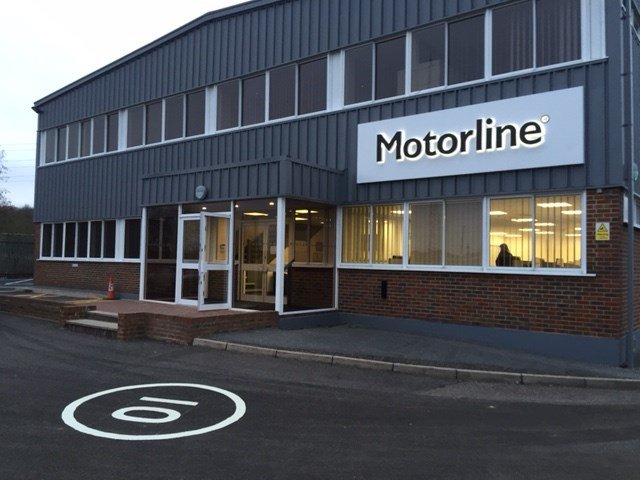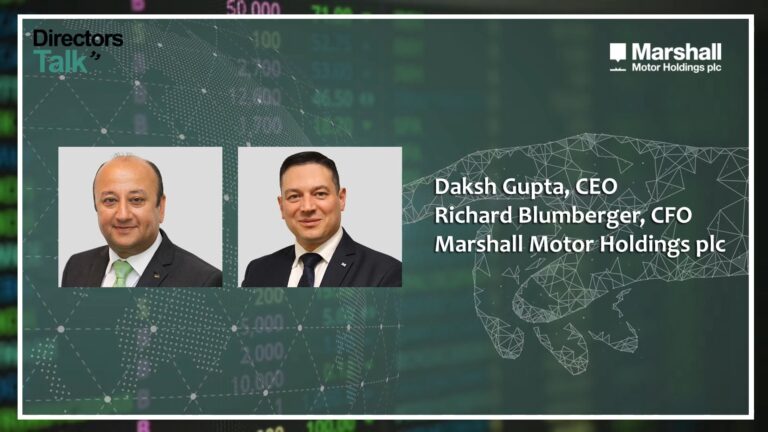Marshall Motor Holdings PLC (LON:MMH) Chief Executive Officer Daksh Gupta caught up with DirectorsTalk for an exclusive interview to discuss their interim results for the six months to 30th June 2018.
Q1: Daksh, you’ve released your half-year results for 2018, what have been the highlights?
A1: Well, we’ve had a positive first half of the year and I’m delighted to report that, despite a more challenging backdrop, the group has produced another strong result with continuing underlying PBT of £16.4 million, up on last years’ record result.
As widely forecast, the new car market declined and our like-for-like new retail sale units were down 5.9%. However, our used car operations have had an excellent first half. Not only did we grow our like-for-like revenues by 5.2%, we also grew our margins significantly. Aftersales revenues continue to show growth, and this was up 3.2% on a like-for-like basis with total gross profit up 1.7% too.
As a result of last year’s leasing disposal which we completed in November, the group’s balance sheet is strong, and I’m pleased to report that we finished the period with a small positive cash balance. The group now has net assets of £201.2 million which equates to £2.58 per share and this is underpinned by over £120 million worth of freehold or long leasehold property. Despite the loss of £2.4 million worth of leasing profit in the first half, we’ve maintained our interim dividend at £2.15 per share.
Finally, despite market uncertainties, our full-year guidance is unchanged at the upper end of previous expectations. So, overall, it’s been a positive first half despite the challenging backdrop.
Q2: So, despite this challenging backdrop, Marshall Motor Holdings have managed to deliver profit growth on last year’s record result, how have you done this?
A2: 2018, we did anticipate a reduction in like-for-like gross profit from new vehicle sales related activity and this is because the new car market had been widely forecast to decline so in preparation for this, management executed several actions to mitigate this.
Firstly, we’ve focussed heavily on other areas of our business outside of new car related activity, aftersales and used cars in particular. In aftersales, we saw the fruits of this focus with like-for-like sales revenue growth of 3.2% which was pleasing. Really, the highlight for us was the used cars performance, our strong trading disciplines saw us significantly drive up margins, in fact our used car margins increased by 37 basis points to 7.2% with revenues up 5.2 as well. This is yielded an overall 9.2% increase in gross profits so an excellent used car performance. When you consolidate all this together, this enabled us to maintain our continuing gross profit margin of 11.5%, that was flat year-on-year but was particularly pleasing in the context of the declining new car market.
Secondly, we’ve had a strong focus on cost control in relation to discretionary spend and despite absorbing a number of structural and inflationary cost headwinds, our underlying operating costs were down 0.3% overall.
You may recall, in November 2017, we announced the closure of 6 loss-making, subscale or non-core sites, and whilst that cost us £2.6 million in lost gross profit, it was overall profit-enhancing as we also eliminated £3.3 million of operating overhead. Therefore, the net benefit in the first half for this action was £0.7 million.
So, in summary, we beat last year’s record result by robust trading disciplines, tight control of costs and positive impact on ongoing portfolio management.
Q3: The car market is obviously facing a number of challenges at the moment but where do you see growth opportunities for the remainder of this year and beyond?
A3: I think, new cars, clearly there are some challenges out there but there are also some market distortions we should be aware of, for example, we have the impact of WLTP, WLTP is the new emissions testing regime which comes into effect on the 1st September 2018. Some manufacturers are actually off the pace in terms of testing their model ranges and this is just primarily due to the sheer scale and complexity of meeting the new testing procedure. As such, it is anticipated there will be a short-term impact on supply for the remainder of the year and possibly in 2019, however, this will be a one-off impact.
In addition, new cars are continuing to see this trend of declining diesel sales, year-to-date you may have seen that nationally diesel sales are down 30% and this decline has put pressure, in particular on the premium segment for the first time in many many years. This is because premium brands have historically had a much higher mix of diesels cars and market demand is now less than a third of all sales. This clearly affects Marshall Motor Holdings more than others because half of our portfolio is premium, however, these premium brands are currently rebalancing supply to match current market demand and I expect the premium brands to come back in due course.
As well as the sector-specific issues I’ve just mentioned, there’s also the wider economic and political uncertainty but of course we can’t control that. What we need to do is we need to keep focussing on what we can control and that’s keep growing in the business that we can drive in particular aftersales and used cars.
That’s the philosophy that I’ve said in the business since I took over as CEO 10 years ago and, I have to say, our people need to take full credit for demonstrating this approach in the first half for 2018. I’d also like to say that, as with any business of portfolio, of scale, such as ours, there’s always areas that you can improve organically, particularly at a business such as ours that’s been so acquisitive in recent years. So, ongoing performance improvements is always going to be a key area of focus for.
Finally, we are operating in a market that’s currently challenging for many and as such, it’s consolidating and there’s no doubt this will present further opportunities for us to grow acquisitively and given the good strong balance sheet, we’re well placed to take advantage of this, should the opportunity arise. Of course, our 10-year M&A track record is strong with a group buying and selling no fewer than 130 operations over that timeline. However, I should say that we’re only going to do this as and when it makes strategic sense for the business and financial sense for our shareholders.







































